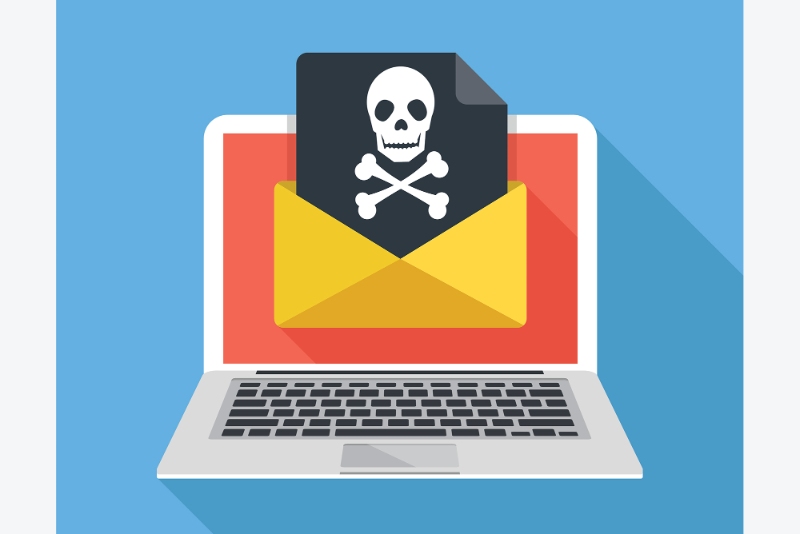People love freebies, deals, and discounts that benefit them, financially. Sadly, fraudsters are making use of this to set up online traps to cheat innocent people. Fraudsters often create fake websites to provide so-called unbelievable offers and discounts. However, these websites exist only to steal personal information. The information they collect is then used to commit fraud.
There was a recent arrest of a 23-year-old graduate of the Indian Institute of Technology (IIT) for committing this type of fraud. He was running a fake website that carried pictures of Prime Minister Narendra Modi and cheated people in the name of providing them Free Laptop Government Scheme on the Occasion of Re-election of the new Government.

This is how he cheated people
The fraudster Rakesh Jangid took advantage of the BJP's Lok Sabha election win to sell a fake scheme. The fraudster created a fake website claiming to provide free laptops to 2 crore Indian youth. To gain the trust of the public, he even used PM Narendra Modi's picture and the "Make in India" slogan.
As part of this scheme, free laptops were given away to all eligible voters on the occasion of the new government's re-election and it was made viral on WhatsApp and other apps.
Users were asked to provide information such as their names, ages, phone numbers, and state of "registration", according to the report. The website -www.modi-laptop.wishguruji.com- successfully collected data about 15 lakh people within two days.
How did the fraudster plan to make money from this scheme?
This scheme was aimed at making money by selling the collected data to cybercriminals. By using these data, cybercriminals could extort money from people.
Additionally, he planned to earn quick money by using Google AdSense. Google AdSense is a program designed to help website owners and bloggers monetize their sites by displaying Google ads. This program allows users to earn money by viewing ads and clicking them. His website received more than 68,000 clicks and 1.52 million page views.
What led to the discovery of this fraud?
Having so much traffic was a problem for the website. Cyber Crime Unit of Delhi Police (CyPAD) noticed an increase in the website's traffic while monitoring online activity. After becoming suspicious, they ordered an investigation.
Also Check: E-Wallet Skimming: A woman from Mumbai lost Rs.1 lakh
How to Avoid such Frauds?
1. Be sure you have thoroughly researched the website before signing up for anything on the website. A genuine company will have all the details of the company on its website, such as an address, email, and phone number.
2. Never accept offers that seem too good to be true. You should make sure to do your research before buying from a company that offers expensive things for free.
3. It is recommended that digital escrow platforms be used for payment. When making an online payment with Escrow, you do not share your financial information with anyone. There is a platform for escrow called Vouch.
How does digital escrow work?
In digital escrow, a third-party account holds the money deposited by the buyer until the seller fulfills the terms of the contract. The escrow company supervises the transacting parties.
What is the role of Digital Escrow in preventing online fraud in India?
Digital escrow services are offered by many companies in India. Among the most trusted is Vouch.
Vouch’s Digital Escrow service is a transparent way for buyers and sellers to build trust and secure a clean transfer of product and payment. Sellers can feel assured that they will be fairly compensated promptly, and buyers will feel confident that their order will be delivered as expected and on schedule. Vouch Digital Escrow keeps you updated and informed at every step of the transaction process till the end. Vouch’s professionals are always available to assist you with all queries that you may have during the entire transaction process.
There is no scope for deceit or fraud since the payments, shipping, delivery, and execution are carried out under the honest and watchful eyes of the Vouch’s professionals. With Vouch, any business transaction becomes transparent, uncomplicated, and hassle-free. If you ever come across a fraudster asking for OTP, asking you to scan a QR code, or asking you to click on phishing links, you can simply refuse and ask him/her to proceed with the transaction through Vouch.
This is Fraud Story #179. Check back here for more fraud stories and scams that you can protect yourself from.
Safety is not just about protecting your credit, debit card number, and UPI accounts. It's about having control of your money till you've received the product or service you bought online!
Note: This is a good-faith initiative to educate the world about avoiding frauds like these and how to act when you're becoming a victim of such a situation.
Do you have a fraud you would like to report? Please write to us at letstalk@iamvouched.com






